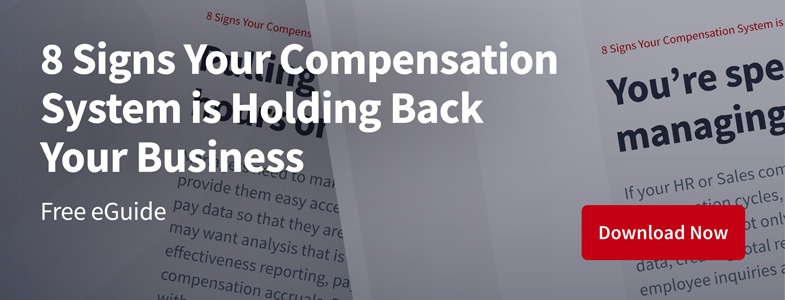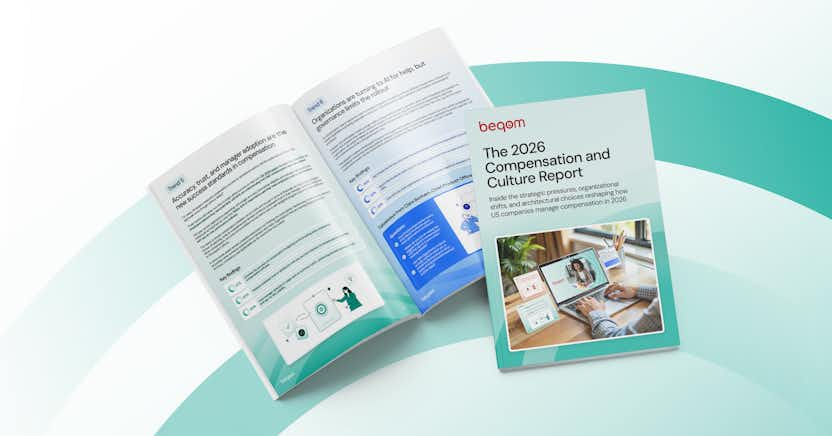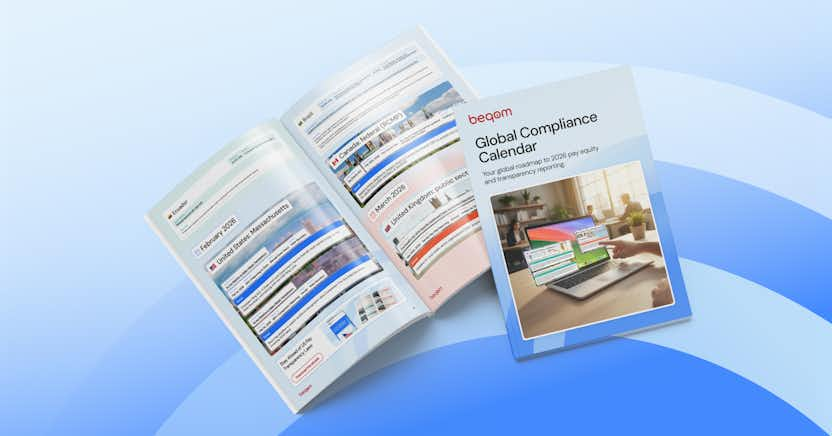Managing Compensation in a VUCA World

Learn more about the following beqom products
Volatility, Uncertainty, Complexity, and Ambiguity. VUCA. Sound like today’s business environment? Sure does, especially as we emerge from the disruption of a pandemic and the Great Resignation into the turbulence of global inflation and the Great Reshuffle. Managing enterprise-level compensation and rewards is challenging enough in the best of times, but in the swirling waters of VUCA, how do you deal with it?
Compensation strategy is one important way that companies guide the ship through rough waters, attracting the right talent, keeping them engaged, and driving the behaviors that will support company goals. HR compensation and benefits teams play a key role in helping to design and implement compensation strategies that help companies adapt to the new uncharted territory. Not an easy task, given the complexity of managing a variety of compensation types and programs in large enterprises.
Reward programs are part of efforts by HR to maintain an employer brand that will attract needed talent, to realign and motivate employees as goals change, to understand and meet changing workforce needs and expectations, to maintain engagement and compliance across remote work locations, and to manage the comp budget and control spend.
The future of rewards has been accelerated
The workplace and related changes in remuneration are changing, yes, but most of the changes are not new ideas. They are based on trends that were already emerging but were greatly accelerated by the pandemic.
For one thing, job roles and career paths that were once predefined and hierarchical now must adapt to agile work, with career paths based on skills and experience. The workplace itself has changed as well. The office-based workplace has become much more flexible and dispersed, owing to more and better collaboration tools and changing mindsets.
Rewards that were applied uniformly across the company now are becoming personalized and aligned to employee needs and preferences. Incentives that once were received in bulk on predefined schedules are moving towards being part of employees’ daily life and paid when most effective.
Compensation teams in HR and Sales need ways to adapt to these new realities and be well positioned to pivot quickly in the future as more change inevitably presents itself.
6 strategies for VUCA-proof rewards
Total Rewards management is crucial in adapting to change. Without the right compensation management systems, you limit your options for response—or risk chaos if you try to implement policies that you can’t execute with the systems you have.
These key compensation management capabilities include:
- Systems that can withstand disruption
- Tools to model, plan, and execute new strategies
- Data to optimize compensation spending
- Ability to realign and motivate sales teams
- Tools to retain and motivate your best performers
- Ability to rebound
Let’s look at each of these.
Systems that can withstand disruption
Of course, you need basic system stability, and a SaaS model gives you that. But you have to consider the human elements in the process as well. If people can’t come into the office, can you still function? Don't wait for the next global crisis to prepare your company for the future. Make sure you have the ability to work in a decentralized fashion as needed, including:
Remote Management. You should be able to access your compensation systems and data, securely, from anywhere. HR and managers should be able to perform all the functions required by their roles relating to pay decisions and actions.
Visibility. You need to be able to give employees, wherever they are, uninterrupted access to their compensation plans, performance results, total rewards statements, commission statements, and compensation processes. When changes to compensation are necessary, it’s important to communicate proactively and provide employees with full transparency.
Delegation. Managers should be able to delegate their roles in the process in case of absence or substitute a surrogate if a manager is temporarily unable to fulfill their role in the compensation process for any reason.
Tools to model, plan, and execute new strategies
You can’t anticipate every twist and turn in the economy or in the needs of your business and employees. What you can do, however, is equip yourself with the tools you will need to figure out how to best move forward when change is warranted. Your compensation management tools, in particular, should allow you to:
Model the best path forward. Understand the impact of staffing reductions, early retirement plans, and other scenarios.
Simulate organizational changes. Run comparison models of structural changes to see the cost impacts.
Implement pay changes, locally. Defer payments or implement temporary pay rate changes, with localized pay models.
Support workforce changes. Implement temporary rewards plans to support remote work or special hazard pay.
Realign incentives and behavior. Adjust bonus plans to focus on service and retention, cost control, or margin targets.
One potential roadblock to smart planning is the urgency of reducing costs in a crisis. Compensation is often one of the first areas that must be cut back when times are hard. But consider carefully: Do you need to cut headcount, or can you adjust comp plans? A simple across-the-board approach to “cut everything by 20%” may harm the business, so be strategic when making cuts; make sure the business still has the resources needed to achieve goals.
Data can help optimize compensation spending
You just can’t make the best decisions without data. Your compensation system should serve as a central repository of relevant data upon which you can do in-depth analysis to support the most effective staffing and pay decisions.
Save the same amount in a smarter way. For example, comp plan adjustments could save headcount, even if they are only temporary.
Analyze compensation effectiveness. See where pay is correlated with good performance, and where it’s not, in a granular way (geographically, by role, etc.).
Set the right pay scales. Be competitive without overpaying for talent, for each role and local market, by comparing to the right benchmarks.
Model cost projections. Don’t guess as to whether or not you can afford a comp plan change; run the numbers through a model to get accurate projections and accruals.
Your compensation system should be able to pull together all the information you need to enable analysis, and have the mathematical and number-crunching capabilities needed to understand your data and do predictive analysis.
Ability to realign and motivate sales teams
Sales is the lifeblood of any organization, and when the organization needs to adapt to market conditions, sales teams will be on the frontlines of the change. Sales compensation teams should have the tools that let them easily:
Change quotas on the fly. Adjust territories and quotas as needed to retain your top performers while still making the best of a bad situation.
Adjust comp plans to reflect reality. If the sales picture is changing, incentive plans will need to shift to align with strategy and be realistic.
Accurately model costs. Upper management will need to know what to expect not just in top-line revenue but in terms of operational costs. You should be able to accurately forecast revised sales comp costs.
Re-prioritize behaviors. If the organization needs to pivot, then you need to be able to quickly change sales incentives to drive the behaviors needed to meet new goals.
Tools to retain and motivate your best performers
Change can be upsetting to employees. As their goals change, they adopt new modes of working, their lives are disrupted, and their personal priorities shift. Your rewards programs can play a role in maintaining engagement and minimizing turnover, by:
Reassuring employees and mitigating negative impacts. If there are changes in compensation, communication and transparency become even more important, as do fairness and trust.
Identifying those at risk to retain your best performers. This takes us back to data. Your own compensation data, coupled with external benchmarks and the right analytical capabilities, can help to identify at-risk employees and prevent unwanted turnover.
Keeping staff aligned with changing strategy. A flexible rewards strategy will give you the wherewithal to quickly adapt comp plans to get everyone on the same page and change course as needed.
Ability to rebound
After all that change, you need to be able to get back to normal again, even if it’s a new normal. When the crisis is behind, will you be able to:
- Reinstate prior sales plans and quotas or roll out new ones?
- Reinstate the salary review or bonus management processes, possibly with different salary ranges or performance criteria or bonus metrics?
- Record special circumstances in employees’ performance and salary history?
Enabling compensation technology
Even in good times it makes sense to leave the spreadsheets behind, or upgrade from limited comp modules. Moving to a dedicated, compliant, and flexible compensation management solution can make your rewards strategy a reality. An investment in best-of-breed compensation management technology can make the difference between success and failure when a crisis hits.








